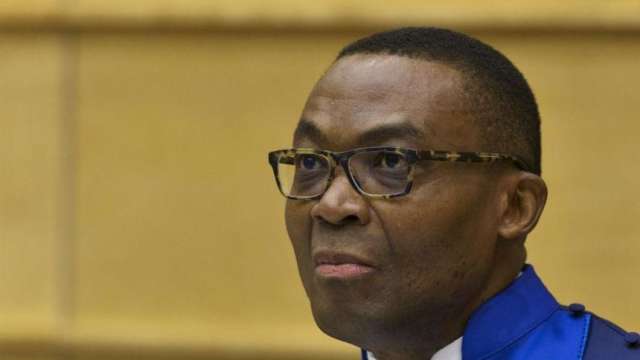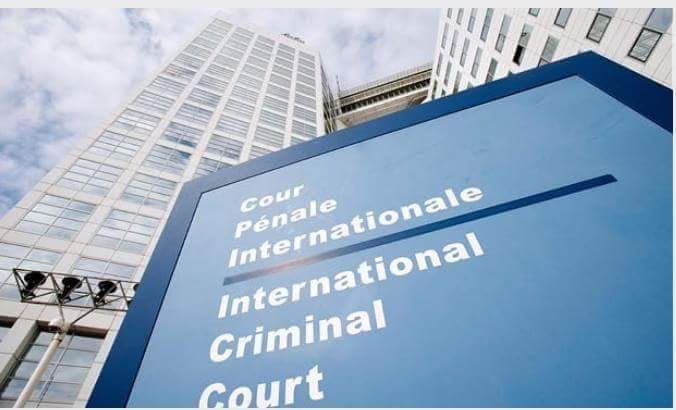ICC President’s Official Visit To Accused State Of Nigeria: A Threat Capable Of Undermining Independence And Integrity Of The Court.
 (Intersociety Nigeria: 15th April 2018) – The leadership of Int’l Society for Civil Liberties & the Rule of Law is deeply worried and dismayed by the recent official visit to Nigeria, an accused State-Party, by the newly elected President of the Int’l Criminal Court (ICC), Igbo-Nigerian born Chile Eboe-Osuji.
(Intersociety Nigeria: 15th April 2018) – The leadership of Int’l Society for Civil Liberties & the Rule of Law is deeply worried and dismayed by the recent official visit to Nigeria, an accused State-Party, by the newly elected President of the Int’l Criminal Court (ICC), Igbo-Nigerian born Chile Eboe-Osuji.
Judge Osuji, from Imo State, Southeast Nigeria, was elected as new President of ICC on 11th March 2018 for tenure of three years (2018-2021). Nigeria presently has eight cases at preliminary investigative stages pending against it and its Boko Haram terror group before the ICC and more cases of heinous rights abuses are being compiled across the country by various victim groups against the perpetrators.
It must be clearly stated here that the right of the Nigerian born ICC President to visit his mother country (Nigeria) including his Igbo Ethnic Nationality in private capacity is sacredly intact and inviolable. But his recent official or “State Visit” to Nigeria is not only uncalled for, but also capable of undermining the independence, impartiality and integrity of the world permanent criminal Court. It also impeaches the law of natural justice particularly the grand principles of neutrality, fairness, impartiality, independence and integrity; upon which the ICC was established twenty years ago in 1998 through the instrumentality of the Rome Statute.
ICC Presidents, elected through Electoral College or among “judges sitting in plenary session” are not elected to embark on shuttling or lobbying missions and courtesy calls especially to member-States or State-Parties and their leaders strongly accused of regime atrocities or crimes against humanity, war crimes and genocide. The Constitutive provisions of the Rome Statute of 1998 setting up the ICC contain sufficient “sovereign rights and remedies” for the accused State-Parties to be properly heard and defend themselves when called upon.
These include the grand principles of “Complementarity and No Impunity”; under which member-States or State-Parties can reject impunity for perpetrators of regime atrocities such as crimes against humanity, war crimes and genocide and take further concrete steps at punishing them in conformity with international best practices through legitimate processes of investigation, arrest, detention, prosecution, conviction and sentencing as well as treatment, rehabilitation and compensation of the victims including the wounded and families of the slain and reconstruction of victims’ properties and public infrastructures devastated or destroyed by the aggressors or perpetrators.
An accused State-Party also has right of communication and fair hearing during preliminary and substantive investigation of its accused officials by the ICC as well as rights of fair hearing, defence and appeal during the pre-trial and trial or prosecution and after conviction stages involving its indicted officials. Rights of review, exit, suspension and re-entry of membership into ICC are also available for all State-Parties including the accused.
However, such rights do not include the referral powers of the United Nations Security Council (UNSC) under Chapter Seven of its Charter (i.e. referring any member-State of UN, whether as a State-Party or non State-Party to ICC for investigation and prosecution of its accused officials by the Prosecutor of ICC; who are accused of committing crimes against humanity, war crimes or genocide against its defenceless civilian population, in part or in whole). This was the case in Sudan in March 2005 through UNSC Resolution 1593 for investigation of President Omar Hassan al-Bashir and other officials of the State on accusations of war crimes and crimes against humanity and genocide and other regime atrocities committed in the country’s Darfur Region.
Specifically, those fingered in the shooting and killing of not less than 400 unarmed pro Biafra activists and hundreds of others shot and injured are still under the State protection since 2015. Those responsible for the death of over 1,130 unarmed Shiite members and supporters as well as hundreds of others shot and injured since December 2015 are still under State protection.
Those responsible for bombing and killing of 236 Christian IDPs in Borno and over 50 rural Christians in Adamawa States on 17th January and 4th December 2017 are still under State protection; likewise those that masterminded the death in military custody inside the Giwa Barracks in Borno State in 2016 of 240 civilians including 29 children between newborn and five years. Till date, all the perpetrators or masterminds in the ongoing Fulani terrorism across Nigeria which have led to killing of not less than 4000 mostly Christians since June 2015 are still protected by the State; with none of them facing trial or diligent prosecution till date.
The present central Government in Nigeria is also recklessly and indiscriminately freeing scores of Boko Haram terror suspects duly investigated, indicted and arraigned in courts since 2013. This is done using prosecutorial technicalities and questionable presidential swap and amnesty deals.Yet, the same Government turns around to persecute unarmed citizens particularly those of Southeast and South-south parts of Nigeria on account of their faith and ethnicity using trumped up charges, long pre-trial detention and unlawful killing, torture and other cruel, inhuman and degrading punishments or treatments.
A clear case in point is the ongoing pre-trial detention of some defenceless citizens of Igbo Ethnic Nationality/Pro Biafra activists since 2015 without proper trial till date as well as vindictive and trumped up charges slammed against them. The central Government of Nigeria also ordered and supervised the killing and maiming of hundreds of them simply because they called for a statehood or geographical reorganization of Nigeria using nonviolence.
The ICC which presently has 123 State-Parties and several signees is hereby called upon not to compromise its integrity and independence by allowing itself to be intimidated and its works undermined by Africa’s genocidal leaders and their agents who go about recklessly and brazenly; perpetrating atrocity crimes in office against their defenceless civilian populations.
It is on record that countries where preliminary and substantive criminal investigations or prosecutions are ongoing or carried out by ICC are those with most atrocious political records and atrocity crimes perpetrated by their State and non State actors. It remains an irrefutable fact that credible democratic countries and their leaders irrespective of continent of origin have nothing to fear over the ICC and its noble tasks of ensuring an end to global impunity in the corridors of power.
Granted that there is need for continuous reform of the ICC especially in the areas of finding common grounds including common definition of Crimes of Aggression as well as ensuring deterrence against external aggressors with respect to their overbearing military influence against lesser powerful nations and territories; with the exception being military activities carried out under UN or regional grouping’s backed peace support operations; but it is the African Continent that direly need urgent and comprehensive political and leadership reforms so as to make themselves less attractive to ICC searchlight and sanctions.
Throughout the ages, sanctions had periodically been visited against perpetrators of most heinous crimes against the human race. In the 40s, there were sanctions visited against 2nd World War criminals in Europe and Asia including Germany and Japan. In the 90s and 200s, sanctions were visited against war criminals in former Yugoslavia, Liberia and Rwanda. Recently, such were also visited against war criminals in DRC, Uganda, Ivory Coast as well as former President of Chad recently convicted and sentenced to life imprisonment by an African regional criminal court.
As it stands now, the ICC has secured very few convictions and consolidated its protracted investigations in Congo DRC, Sudan, Darfur, Central African Republic, Kenya, Libya, Uganda, Ivory Coast, Mali, Burundi and Republic of Georgia. Preliminary investigations have also been opened in Columbia, Afghanistan, Gabon, Guinea, Palestine, Iraq, Philippines, Venezuela, Ukraine and Nigeria.
In all these, the ICC has not done enough in commensuration of its mandates, yearnings and expectations of the victim populations and generality of the people around the world. The Court must go beyond its present protracted investigations and fanfare shuttling and handshake of the graveyard with accused State-Parties. The long delays by the Court in meeting the yearnings and expectations of the global populations especially the growing victims of State atrocity crimes may most likely push the Court to the brinks if care is not taken.
Already the global influence of the Court is beginning to wane across countries and regions. This is on account of its snail pace and perceived rubber stamp status. There are cases still pending before the Court for almost, if not up to ten years or more. Other tasking challenges facing the ICC are occasioned by poor investigations and generation of watery evidence and fragility associated with poor witness management including profiling.
While ICC continuously rigmaroles and craws, its space and influence are speedily on decline; taking over by emerging regional and municipal courts assuming int’l civil and criminal jurisdictions over human crimes of heinous nature. A clear case in point is the Dakar based African Special Criminal Court for Chad which had in May 2016 secured conviction and life sentence against former President Hissene Habre of Chad; over his heinous abuse of human rights including rape, sexual slavery, torture and ordering for massacre of thousands of civilians during his days as military president of Chad from 1982 to 1990. In the USA State of Philadelphia, its Federal Courthouse sat for just one year (2016-2017) and convicted Mohammed Jabbateh over his ignorable roles in the Liberian Civil War of 1989-1997 where he was a leader of the National Patriotic Front of Liberia or NPFL.
ICC must therefore sit up and protect its independence, impartiality and integrity globally before it is swallowed and overshadowed by the rising influence, acceptability and popularity of emerging municipal courts speedily assuming international civil and criminal jurisdictions in matters of heinous human rights violations and abuses across the world.
By joint advocacy accounts of the Civitas Maxima and Global Justice & Research Project groups 2018, Courts in USA, Belgium, Switzerland, UK, etc now assume both criminal and civil international jurisdictions over heinous or atrocity crimes committed against civilian populations by atrocity perpetrators in foreign countries. Key Liberian war criminals including Jucontee Woewiyu (former leader of NPFL), Agnes Taylor (wife of Charles Taylor), Martina Johnson (former commander of NPFL) and Alieu Kosiah (former commander of ULIMO) are billed to face trials this year in various municipal courts located in USA, Belgium, Switzerland and UK for their atrocious or ignorable roles during the Liberian Civil War of 1989-1997.
Similarly, Mrs Esther Kiobel, wife of one of the slain Ogoni Nine (Dr. Berinem Kiobel) had also filed a civil claimant suit in far away Netherlands against the Royal Dutch Shell PLC for its complicity in unlawful arrest, detention and death of her husband, late Dr. Berinem Kiobel who was hanged alongside other Ogoni Eight in 1995 during the darkest era of military incursion into Nigerian political space. The civil suit was instituted in 2017 in Netherlands where the Royal Dutch Shell is registered. Earlier in 2009, the Royal Dutch Shell paid $15.5m to settle lawsuit brought against it by the now late son of the slain leader of Ogoni Nine, Ken Saro-Wiwa (Ken Saro-Wiwa Jr.) and others including the brother of late Ken Saro-Wiwa (Snr.). Credit: Amnesty Int’l and CNN 2017.







